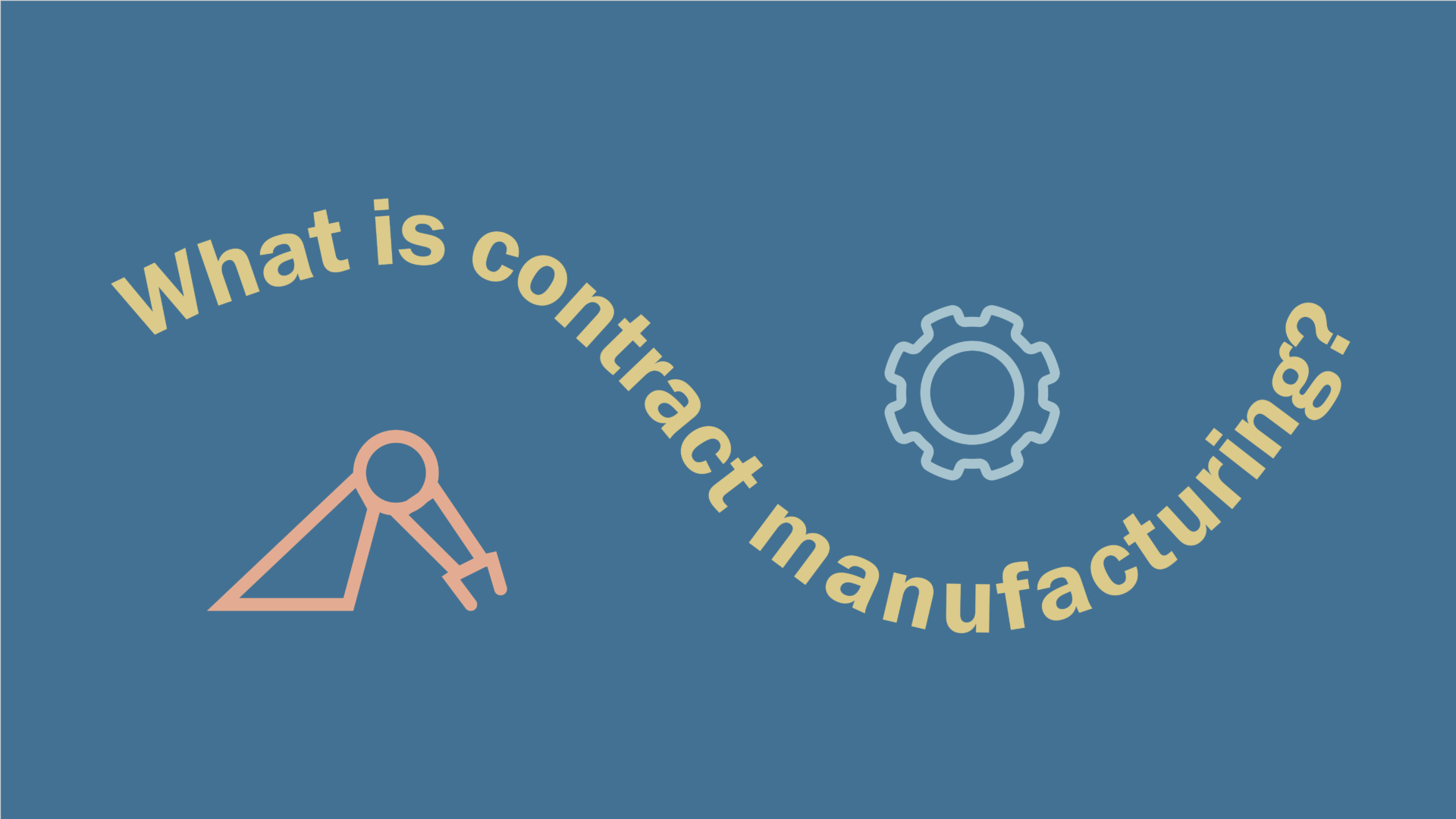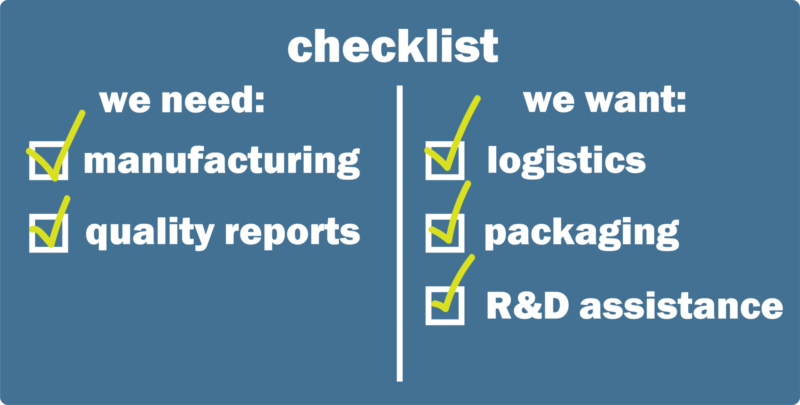What is contract manufacturing and why is it important?

Contract manufacturing as a term is very broad and it includes many essential business functions underneath it. What a contract manufacturer essentially does, is produce products for another company, that they sell under their own name and brand. Turning to a contract manufacturer can have many reasons and benefits. Here are some of the key takeaways on why contract manufacturing exists and why is it important.
Why contract manufacturing?
Like said before, the reasons on why a company chooses to turn to a contract manufacturing can be numerous and they can relate to the availability of manufacturing resources or technologies, availability of production space, the knowledge available from both partners, financial reasons and many more. Contract manufacturers often provide the customer with their full expertise on how to make a product, as well as providing the necessary technologies and facilities for that.
Imagine that your business is already pretty established, your existing products are selling nicely and you have innovative new ideas to complement your product portfolio. You want to extend your product line into a new product, that is more complex due to customer needs, but the sales forecasts are looking well above the products that you sell at the moment. Starting a new production line for this product is definitely necessary to reach all of your goals, and you want to get to work already. The same principles of getting together with a contract manufacturer apply for example when you’re starting a new business, so if you’re thinking of the best way to get your production rolling, keep reading!

The product is awesome, you know how to design it, you have the blueprints, the marketing campaigns are ready to roll. The financial forecasts are in, and the demand within the target market should go over the roof if everything goes well. Then, you get the price for the equipment needed for the production, and it makes your hands sweat, just a little bit. A lot of people working at manufacturing know this feeling very well. So, what to do next? You know that the price tag on the machinery and all of the necessary trinkets is just too much to get started with. Or if you’re starting your new business, it would be your first big acquisition and you don’t necessarily have the knowledge on how to optimise the process to be able to reach your financial goals on costs
In case of something like this, it might be wiser to look for a partner. A contract manufacturer, who is more than happy to make your product from start to until it arrives to your loading dock. In most cases, the contract manufacturer already possesses the necessary expertise and equipment to take good care of you and your manufacturing. Let’s unbox this package of the possible issues with this awesome product and see how a good contract manufacturer might be helpful.
First of all, you have the product design ready. Good job, but what if there is something that could be designed a little bit better considering the manufacturability of the product? When you find a good contract manufacturer, they will be able to tell you exactly what that might be, as well as how to improve the design, if you want to! Finding a contract manufacturer, who knows their way around automation solutions can help you improve the product. In addition, the contract manufacturer is probably able to offer you alternative technologies considering the manufacturability. Even material choices might be a big factor in reaching the ultimate goal of having a smart, profitable product with good manufacturability features.
Second of all, the forecasts look very nice considering the product volumes. Again, well done on creating a product that has a clear target market and enough demand to make a plus sign on your financial statement. You did the math, and you would definitely need more production capacity on top of what you’re running with now. But again, when negotiating with the possible contract manufacturer, they made it very clear that your production can be running day and night, and your volumes are very doable, and they can be even increased in case if it’s necessary. The raw materials flow through their efficient procurement channels, and your production can be scaled up as much as you need.
In addition to the already existing production means, the contract manufacturer has a good reputation of producing high quality products with on-time deliveries. If you’re lucky, they will also be located conveniently related to your headquarters. This made you think about the carbon footprint of your product, and how you could reduce that. Or at least we hope you thought about that! Strategic location is an important feature to think about.
So now that we have unboxed the issues that gave you that slight wet hands-feeling in the start, we can take a closer look at contract manufacturing and what it entails in more detail.
What does contract manufacturing include?
It’s up to you! Most small- to medium-sized contract manufacturers rely on their flexibility. You can basically choose what services you would want to have. Naturally, the contract manufacturer might want to offer you the most extensive service that they possibly can. Sometimes that makes a lot of sense to both of you, sometimes not. The biggest contract manufacturers on the other hand tend to be less flexible about contractual matters and what you will have to commit to.
Some articles that examine the advantages and disadvantages of contract manufacturing quite often mention a certain loss of control over your product as a disadvantage. We wanted to make note of this, because for us this sounded quite negative, and actually quite the contrary to reality. At least in our way of operations, the wishes and requirements of our customers are the base for any production. Any demands for the product or the production are taken into account before driving up the production, and ensuring good communication ensures flexibility if needs for changes should arise.

So more in practice what contract manufacturing includes, is services for manufacturing and the manufacturing itself. What you get included in the manufacturing again depends on the partner you choose and your needs more in detail. Some contract manufacturers prefer to just manufacture, others provide extra services including R&D, testing, logistics and other supporting functions. All of this, usually tailor-made to match your exact needs. Something to keep in mind as well is that some contract manufacturers, especially the bigger ones will have to consider the amount of yearly revenue they can create with your contract. Small sales might not be interesting for them, so bear this in mind and pay attention to your production needs and have a two-way conversation with the contract manufacturer about your goals!
One of the big advantages with contract manufacturing are the possibilities for product or process development. We discuss these benefits more in depth in another article, Streamlining your supply chain. But we really wanted to emphasise this point, because in the end, the best ideas usually come out when a group of experts in their fields put their heads together with clear communication and teamwork. In the best-case scenario, when you find a good contract manufacturer, they will be ready to collaborate with you on your product development needs and desires.
How to find a good contract manufacturer?
Let’s be honest, it’s all about the research. All of the companies in the world say that they are the best. But how do you actually find the best option for you? Research, of course. Ask around, read up on technologies, utilise your networks and ask for any recommendations. Before research though, the first step would be to internally analyse your manufacturing needs in-depth.
What is your core business? What is your vision product- and business-wise? Is there something else you need in addition to the manufacturing? Maybe your product is more complex and requires some kind of assembly or testing. Will you want to customise the product in the end by yourselves? And what about logistics? If your own logistics network looks complex, or simply just expensive, maybe that could be taken care of by your contract manufacturer as well. Making sure that you are aware of the requirements related to your specific industry, such as environmental issues, quality requirements and compliance with different regulations is an important aspect to think about as well. Find a contract manufacturer that is on the same page with you, and complies with the necessary requirements as well.
We listed some good tips from our procurement professionals in the article about streamlining your supply chain here. Here are some of them as well, if you’ve started to consider partnering with a contract manufacturer or if you just want to get to the good stuff.
-ask for recommendations from your network
-find out about the candidates’ certifications and technological expertise
-check that the contract manufacturer is financially sound, as well as reliable with contractual matters (NDAs, delivery reliability)
-make sure you have good communication with the contract manufacturer from the beginning
-find a contract manufacturer that has their ESG strategy clear (environmental and social governance)
-ensure that the contract manufacturer has an established and competitive logistics network (if you need logistics services as well)
– make sure you have a procurement strategy in place and try to find a contract manufacturer that matches your strategy and its goals
Having a clear procurement strategy cannot be stressed enough!
After coming up with a decision, make sure you have good “chemistry” with the contract manufacturer. Negotiating the contract and figuring out all of the practicalities is a long process, and it requires constant communication between you and your new contract manufacturer. Finalising the contract and starting up production might take anything from a few months to even a year, that’s why good chemistry is so essential. The road might not be straight and lined with flowers, but in the case you found an awesome partner, it will be worth it!
What happens after finding that perfect match?
Like said before, going through the process of finding a great partner might be a lengthy one. But let’s imagine that you have the contract signed after a successful period of conversation, and after a few prototypes, it’s finally time to start the actual production.
Depending on the contract manufacturer, you will probably be very much involved in the process of getting the production running. In the beginning, you might have daily or weekly communication about how everything is going, and production batches will be quality controlled carefully to determine whether the current process is optimised well. Usually, the contract manufacturer takes care of all of those practical matters related to the production.
A good thing to know about production optimisation, and a little something that we mentioned in our article about streamlining your supply chain: when you’re collaborating with a contract manufacturer that is able to provide multiple production technologies under the same roof, the product lead time from design to the market will be considerably shorter, than compared to if you would be doing it all by yourself. Finding that perfect partner, who has the expertise in testing, automation and optimising your production, will make your product management much more straightforward and easier.
Good collaboration between you and your contract manufacturer is best described as smooth! Like said before, your communication might be quite frequent when you’re starting up the production with your contract manufacturer. Normally, quarterly or yearly meetings are a regular part of the communications. Having a good bigger picture of your production is usually the responsibility of an account manager in the manufacturing company. We wrote an article about one of our longest customer collaborations, that describes the role of the account manager through more than a decade of experience. You can take a look at the article by clicking here.
After your production is running, then what? Well, that’s the point of contract manufacturing. Then, you focus on your sales, marketing and other functions such as R&D and innovation! The biggest advantage with a contract manufacturer is that you save tons of time to be spent on other operations. Being on top of things related to your production is surely a daily or a weekly task, but otherwise, you can pretty much sit back and do what you do best.
If you’re interested in how our extensive technology expertise could help you with your contract manufacturing needs, take a minute and fill our our contact form. We will get back to you as soon as possible with our opportunities!